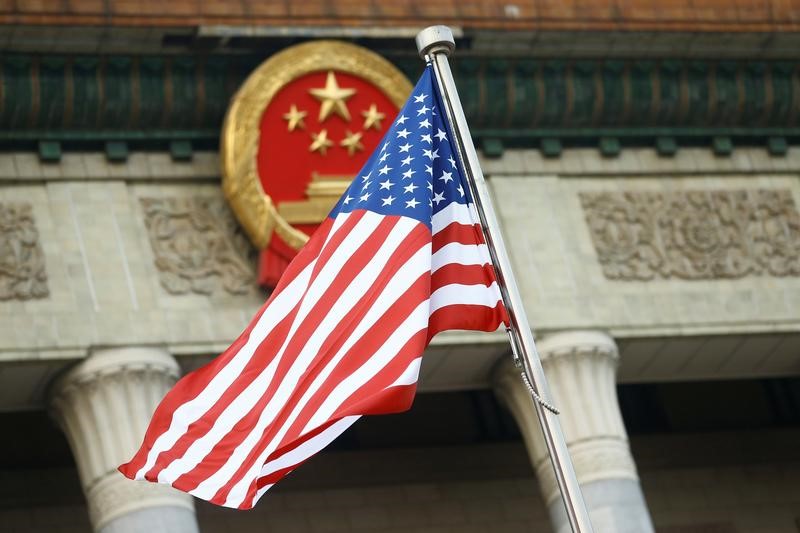Investing.com - Here are the top five things you need to know in financial markets on Monday, August 5:
1. Beijing lets yuan slide, strikes back at U.S. agriculture
China retaliated against U.S. President Donald Trump's threat of a fresh 10% tariff on $300 billion in Chinese goods starting on Sept. 1 by allowing its currency to drop below 7 to the dollar for the first time in a decade, sparking fears of a round of competitive devaluations across the globe.
Trump has long been critical of Beijing for manipulating its currency to gain a trade advantage, and additional yuan weakness could further escalate tensions with Washington.
The Chinese government also told its state-owned enterprises to suspend imports of U.S. agricultural products, according to people familiar with the situation cited by Bloomberg.
2. Global stocks enter risk-off mode as tensions rise
Risk-off sentiment intensified on Monday as the slide in the yuan, and Beijing’s reported order to halt U.S. agricultural imports, sparked sell-offs in commodity and stock markets in Asia and Europe.
European stocks slumped nearly 2% while U.S. futures pointed to a decline of more than 1% at the open.
Asian stocks fell to a six-month low while the Hang Seng index led losses in the region as Hong Kong entered a ninth week of protests, including a city-wide strike, its first in more than 50 years.
Trump’s threat to increase tariffs on Chinese goods had sent the S&P 500 to close last Friday with its worst weekly performance of the year, a slide of 3.1%. The Nasdaq tumbled 3.9%, also its largest weekly decline in 2019, while the Dow racked up a 2.6% drop, its second worst of the year.
The U.S. will likely remain focused on trade developments as the deluge of earnings slows this week with only around 62 S&P 500 companies reporting. Loews (NYSE:L), Tyson Foods (NYSE:TSN) and Cars.com (NYSE:CARS) are among those firms scheduled for release on Monday.
3. Safe-haven demand soars amid trade tensions
With risk-off sentiment in full swing, investors flocked to safe-haven assets in a flight from riskier equities.
Spot gold jumped more than 1% to its highest level since May 2013.
Fixed-income demand was reflected by the yield on the U.S. 10-year Treasury hitting a three-year low of 1.74%, more than 30 basis points below where it was before Trump's tweets on Friday. Germany’s 10-year Bund saw its yield plunge further into negative territory, marking an all-time low of -0.54%.
In forex markets, safe-haven currencies such as the Japanese yen and Swiss franc rose against the U.S. dollar, while higher-yielders such as the Aussie dollar and Korean won fell.
Bitcoin, which some market participants argue should be considered a safe-haven asset, jumped around $1,000, shooting past $11,000 over the weekend for the first time in two weeks.
4. U.S. services sector activity on watch
In a thin day for U.S. economic data, market focus will center on the Institute of Supply Management’s purchasing managers’ index for the services sector, America’s largest, at 10:00 AM ET (14:00 GMT).
The non-manufacturing PMI for July is expected to strengthen slightly after the manufacturing gauge registered its weakest reading in nearly three years last week.
A similar survey for China released overnight showed the country’s services sector expanded at the slowest pace in five months.
Surveys in Europe showed the general trend that a rapidly deteriorating manufacturing sector offset robust growth in services, according to IHS Markit, while the fact that the U.K.’s services sector activity hit a nine-month high did little to derail the risk of stagnation in the third quarter.
5. Oil prices tumble on trade worries
Concerns that the escalating U.S.-China trade dispute will exacerbate the global economic slowdown, denting demand for oil, sent crude prices sliding around 1%.
That was despite the fact that Iran reportedly seized another oil tanker in the Persian Gulf, accusing the vessel of smuggling fuel for some Arab countries.
It is the third tanker seizure in the Strait of Hormuz, increasing worries that conflict could disrupt supply from one of the key shipping points for global oil.
-- Reuters contributed to this report.
